Lana Hechtman Ayers, WHEN ALL ELSE FAILS
WHEN ALL ELSE FAILS, Lana Hechtman Ayers. The Poetry Box, Portland, OR, 2023, 128 pages, $18.00, 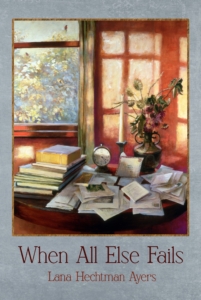 https://thepoetrybox.com.
https://thepoetrybox.com.
When All Else Fails is a book-length memoir, beginning in the dark basement of a childhood of abuse and poverty, isolation, and estrangement. A violent mother, schoolmates who shun and ridicule. But lifting into something above storm-blown shingles of a rooftop. I imagine it a cupola filled with light, or the starry sky itself.
Poetry’s saving power is everywhere evident in these poems, even in the poems from childhood. In “The Slap,” for instance, where a leaf speaks, and in “The Thing with Feathers,” where a small brown bird outside a child’s window comes into its name, a wren. Of course the poet will find a way to rename herself (and it won’t be “fatso,” or “retard”), to love herself. A father’s patient presence despite hardship is a great help, as are good grandparents.
And books: “Library books saved me from a dark childhood,” the poet writes in “Savior,” a poem about her brother’s less bookish transformation. In poems such as “I never thought to lie down with my father” (the title is the first line of the poem), and “I Knew,” with its perfect epigraph from Ellen Bass—What if you knew you’d be the last / to touch someone—we witness the poet’s transforming forgiveness even of her mother. Let me add a little to this. From early in the book, we know the mother’s violence, her name-calling. But in “I Knew,” late in the book, we see another way to be:
Leaning in close
I kissed her cold forehead,
kissed her rigid mouth,
kissed her angry mouth,
my touch being her last,
knowing she would hate that. (p 55)
Many of the poems lean on narrative, and some pieces are in prose. But this is a poet who can, just as easily, delight us with music and image. Consider this, the first poem in the collection:
My River Runs
My river waits reply.
—Emily DickinsonBorn to basement rivers after rainstorm.
To a Charlie Brown rose bush that teetered
on a single thorned bough, and the one bud
a season that never opened.
Born to mother’s word.
Bus rides with multiple transfers,
escape being more waiting & wrecked
umbrellas than flight.
Born to wide feet, wearing men’s boots,
treading-gait free of grace.
Born to Neruda’s short love & long remembering.
To the door ajar that oceans are.
Born to if only and why must…
To discover the Atlantic’s pulse in my throat,
the Acadia forest beneath my ribcage.
Born to trip, to topple, to tumble.
Born to the sky’s reporter,
mood ring for the rain.
To be a lap for paws, a map of bejeweled weariness.
To memorize the changing light.
Born to curl hand around pen and ride
the whitewater rapids of poetry,
no lifejacket required.
—Lana Hechtman Ayers
The arc of the book takes us from childhood to age, from New York to Oregon where she now lives and writes, and holds our hand through the loss of dear friends and mentors, and recent hard times: Covid-19, race injustice, gun violence, personal illness. Always, the sunlight breaks in so that odes to breasts and biopsies stand side by side with odes to camellias. It’s a primer on how to navigate a life with grace.
Just a few words more on being saved by poetry. Hechtman Ayers is the managing editor of three poetry presses—Concrete Wolf, MoonPath Press, and World Enough Writers. In these poems, over and over, she reveals herself as a true believer:
I am waiting for the police
…to be taken into
custody by poets,
and taught to recite Dickinson
and Whitman from memory. (from “What I Am Waiting For,” p 69)For now, all I want to do
is pray day and night:
Pablo Neruda, Warsan Shire,
Langston Hughes, Patricia Fargnoli,
Richard Blanco, Alison Luterman,
Octavio Paz, Ellen Bass. (from “Creed,” p 109)
 To learn more about Lana, visit her Poetry Box book page, here, or her website, https://lanaayers.com/index2.htm, where you can sign up for her newsletter, always a poem she has gleaned from her reading. And, while there, soak up the quote that adorns her opening page, a quote she very clearly lives by:
To learn more about Lana, visit her Poetry Box book page, here, or her website, https://lanaayers.com/index2.htm, where you can sign up for her newsletter, always a poem she has gleaned from her reading. And, while there, soak up the quote that adorns her opening page, a quote she very clearly lives by:

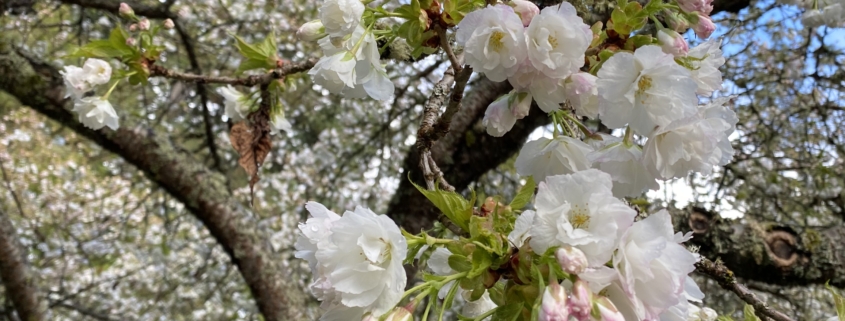
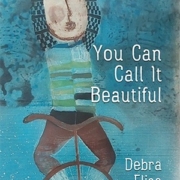
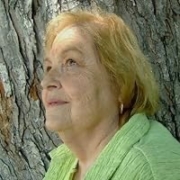
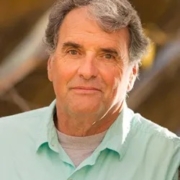
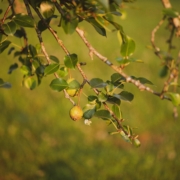
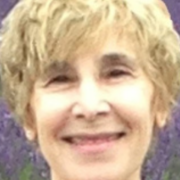
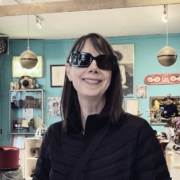
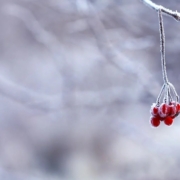
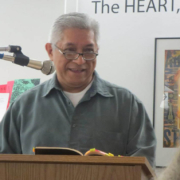


Wonderful thoughts and tribute, to post on Good Friday.
In fact, it seems that II’ve been experiencing a new angle on my own mother. But, even so, I want to ask if you are perhaps skimming over the darker undertones of the last line of “I knew.” (Given, remember, “what if you knew you’d be the last / to touch someone”). I wonder what others might think about this?
I think I know what you mean and I can speak to that. To my mind, it isn’t that the poem forgets what’s come before, but the act of touching, caressing the body — now finally able to do so without repercussions — seems so redemptive to me. The forgiveness isn’t for the mother, but for the speaker. You’re right, it would be a terrific discussion.
I mean, forgiveness isn’t for the recipient’s benefit (though it can be), but for ours — forgiveness heals us. That’s my thought.
Thank you, Bethany, for yet another thoughtful review. Lana’s collection is powerful, and you’ve captured its essence with grace. I love these lines:
I am waiting for the police
…to be taken into
custody by poets,
and taught to recite Dickinson
and Whitman from memory. (from “What I Am Waiting For,” p 69)